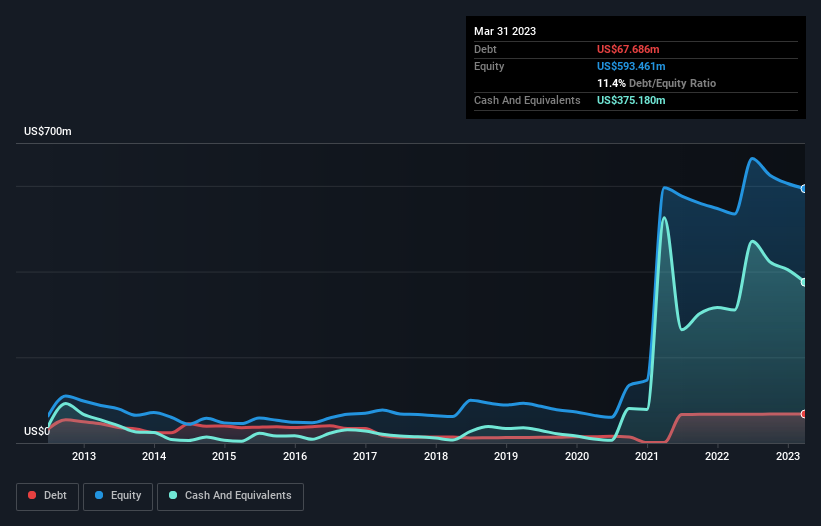
Howard Marks put it nicely when he said that, rather than worrying about share price volatility, 'The possibility of permanent loss is the risk I worry about... and every practical investor I know worries about.' It's only natural to consider a company's balance sheet when you examine how risky it is, since debt is often involved when a business collapses. We note that Gevo, Inc. (NASDAQ:GEVO) does have debt on its balance sheet. But is this debt a concern to shareholders?
When Is Debt Dangerous?
Debt and other liabilities become risky for a business when it cannot easily fulfill those obligations, either with free cash flow or by raising capital at an attractive price. Ultimately, if the company can't fulfill its legal obligations to repay debt, shareholders could walk away with nothing. While that is not too common, we often do see indebted companies permanently diluting shareholders because lenders force them to raise capital at a distressed price. Having said that, the most common situation is where a company manages its debt reasonably well - and to its own advantage. The first step when considering a company's debt levels is to consider its cash and debt together.
View our latest analysis for Gevo
What Is Gevo's Debt?
The chart below, which you can click on for greater detail, shows that Gevo had US$67.7m in debt in March 2023; about the same as the year before. However, its balance sheet shows it holds US$375.2m in cash, so it actually has US$307.5m net cash.

A Look At Gevo's Liabilities
We can see from the most recent balance sheet that Gevo had liabilities of US$25.6m falling due within a year, and liabilities of US$69.7m due beyond that. On the other hand, it had cash of US$375.2m and US$2.07m worth of receivables due within a year. So it can boast US$282.0m more liquid assets than total liabilities.
This surplus strongly suggests that Gevo has a rock-solid balance sheet (and the debt is of no concern whatsoever). Having regard to this fact, we think its balance sheet is as strong as an ox. Succinctly put, Gevo boasts net cash, so it's fair to say it does not have a heavy debt load! The balance sheet is clearly the area to focus on when you are analysing debt. But ultimately the future profitability of the business will decide if Gevo can strengthen its balance sheet over time. So if you want to see what the professionals think, you might find this free report on analyst profit forecasts to be interesting.
Over 12 months, Gevo reported revenue of US$5.0m, which is a gain of 644%, although it did not report any earnings before interest and tax. That's virtually the hole-in-one of revenue growth!
So How Risky Is Gevo?
By their very nature companies that are losing money are more risky than those with a long history of profitability. And in the last year Gevo had an earnings before interest and tax (EBIT) loss, truth be told. Indeed, in that time it burnt through US$116m of cash and made a loss of US$100m. With only US$307.5m on the balance sheet, it would appear that its going to need to raise capital again soon. The good news for shareholders is that Gevo has dazzling revenue growth, so there's a very good chance it can boost its free cash flow in the years to come. High growth pre-profit companies may well be risky, but they can also offer great rewards. When analysing debt levels, the balance sheet is the obvious place to start. But ultimately, every company can contain risks that exist outside of the balance sheet. For instance, we've identified 4 warning signs for Gevo (1 can't be ignored) you should be aware of.
Of course, if you're the type of investor who prefers buying stocks without the burden of debt, then don't hesitate to discover our exclusive list of net cash growth stocks, today.
New: Manage All Your Stock Portfolios in One Place
We've created the ultimate portfolio companion for stock investors, and it's free.
• Connect an unlimited number of Portfolios and see your total in one currency
• Be alerted to new Warning Signs or Risks via email or mobile
• Track the Fair Value of your stocks
Have feedback on this article? Concerned about the content? Get in touch with us directly. Alternatively, email editorial-team (at) simplywallst.com.
This article by Simply Wall St is general in nature. We provide commentary based on historical data and analyst forecasts only using an unbiased methodology and our articles are not intended to be financial advice. It does not constitute a recommendation to buy or sell any stock, and does not take account of your objectives, or your financial situation. We aim to bring you long-term focused analysis driven by fundamental data. Note that our analysis may not factor in the latest price-sensitive company announcements or qualitative material. Simply Wall St has no position in any stocks mentioned.
About NasdaqCM:GEVO
Flawless balance sheet with limited growth.
Similar Companies
Market Insights
Community Narratives



